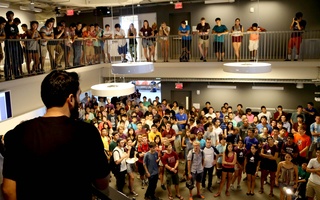When the United States Supreme Court heard the first case challenging affirmative action in higher education in 1978, Harvard defended the use of race in admissions decisions.
Now, as the Court takes up the issue again more than 30 years later, Harvard is likely to lobby the Court in favor of affirmative action once again, according to University General Counsel Robert W. Iuliano ’83.
“Harvard has long believed that a diverse class enhances the educational experience for all of our students,” Iuliano wrote in a statement. “I anticipate that the University will seek to express its views to the United States Supreme Court in the Texas case, just as we did in the prior two occasions when the Supreme Court took up this issue of vital importance to higher education.”
In 1978 and again in 2003, the University filed briefs with the Court explaining its holistic approach to college admissions, in which race is one of many factors used to evaluate an applicant.
On both occasions, the Court upheld the consideration of race and touted Harvard’s method as an appropriate “individual” approach.
The Court announced Tuesday that it would hear Fisher v. University of Texas in its next term.
Abigail Fisher, a white student who was denied admission to the University of Texas, filed a lawsuit against the school alleging racial discrimination.
The case will mark the first time the Court has examined the issue of affirmative action in higher education since Grutter v. Bollinger and Gratz v. Bollinger in 2003. In those cases, the Court again upheld the right to consider race as part of a holistic approach to college admissions.
But since then, the composition of the Court has changed dramatically. Most significantly, former Justice Sandra Day O’Connor—the Court’s swing vote and author of the Grutter decision—departed in 2006, leaving Justice Anthony M. Kennedy as the swing vote in close decisions.
“Anthony Kennedy is unpredictable on this. He can be found on both sides of this issue,” said University of Texas law professor Sanford V. Levinson. “One can predict that the briefs and the oral argument in this case will be directed exclusively at Anthony Kennedy.”
Given the conservative bent of the Roberts Court and the decision of left-leaning Justice Elena Kagan, a former dean of Harvard Law School, to recuse herself, many legal experts expect that the justices will rule against the University of Texas.
But even if the Court rules against Texas, the justices may narrow the scope of the decision by limiting its applicability to the specific case at hand, said Harvard Law School professor Mark V. Tushnet ’67.
“Maybe there are some circumstances when the use of race is narrowly tailored, but Texas’ program is not narrowly tailored,” said Tushnet. This suggests, Tushnet said, that a ruling against Texas may eliminate affirmative action in effect, if not explicitly.
Law professors said that given Harvard’s stake in the debate, they expect that the University will file an amicus curiae brief—a formal legal expression of support—in favor of affirmative action.
As an institution that receives federal funding, Harvard must comply with federal laws regarding discrimination under Title VI of the Civil Rights Act of 1964.
Levinson, who also served as a visiting professor at Harvard Law School this past fall, said he anticipates that other institutions of higher education will file briefs in support of the University of Texas as well.
Levinson said he will be interested to see if any individual professors file briefs in favor of the plaintiff.
“Quite frankly, I would be surprised,” Levinson said. “It’s an extreme position.”
Tushnet said he believes that Harvard’s decision on whether to file a brief might be influenced by the University’s view of itself as a trendsetter in higher education.
“Harvard sees itself as a leader in higher education policy for the nation,” said Tushnet. “The University regards what it has to say as important to know.”
—Staff writer Justin C. Worland can be reached at jworland@college.harvard.edu.
Read more in News
Harvard Grad Concocts Cookie Business in ShanghaiRecommended Articles
-
Ruling on Affirmative Action Draws ReactionAfter a federal court turned down a lawsuit that challenged a Michigan ban on affirmative action, reactions from Harvard professors
-
Kagan's Nomination for Supreme Court Seat Is Likely ProspectIn the face of Justice John Paul Stevens’ impending retirement, the nomination of former Harvard Law School Dean Elena Kagan for the open seat on the Supreme Court has become a likely prospect.
-
Law School Professors Weigh In on Supreme Court Same-Sex Marriage CaseAfter the U.S. Supreme Court heard the oral arguments for two landmark same-sex marriage cases this week, Harvard Law School professors predicted that the justices would not uphold the Defense of Marriage Act and were unlikely to make a sweeping decision concerning Proposition 8.
-
HLS Professor Predicts Future of Supreme CourtHarvard Law School Professor Mark V. Tushnet ’67 hypothesized that, in the event of an appointment to the Supreme Court in 2016, the judge appointed will be either Asian-American or African-American. This hypothesis came after Tushnet claimed to have accurately predicted the appointment of Justice Sonia M. Sotomayor in 2008.
-
 Harvard Hits Roadblock in CS50 Trademark Applications
Harvard Hits Roadblock in CS50 Trademark Applications













